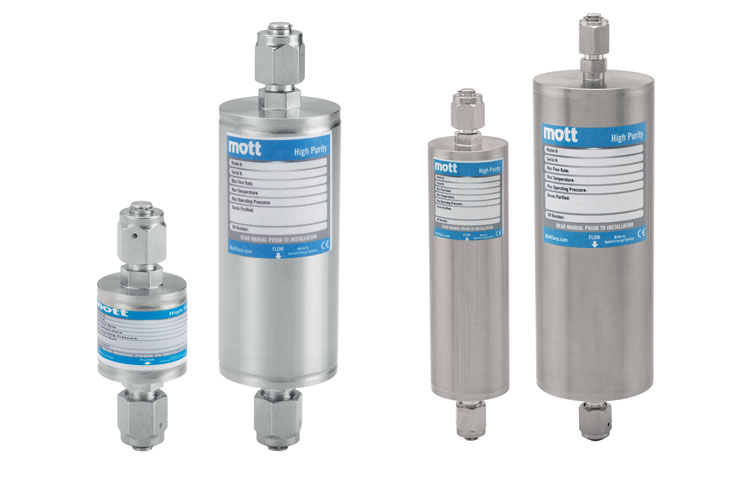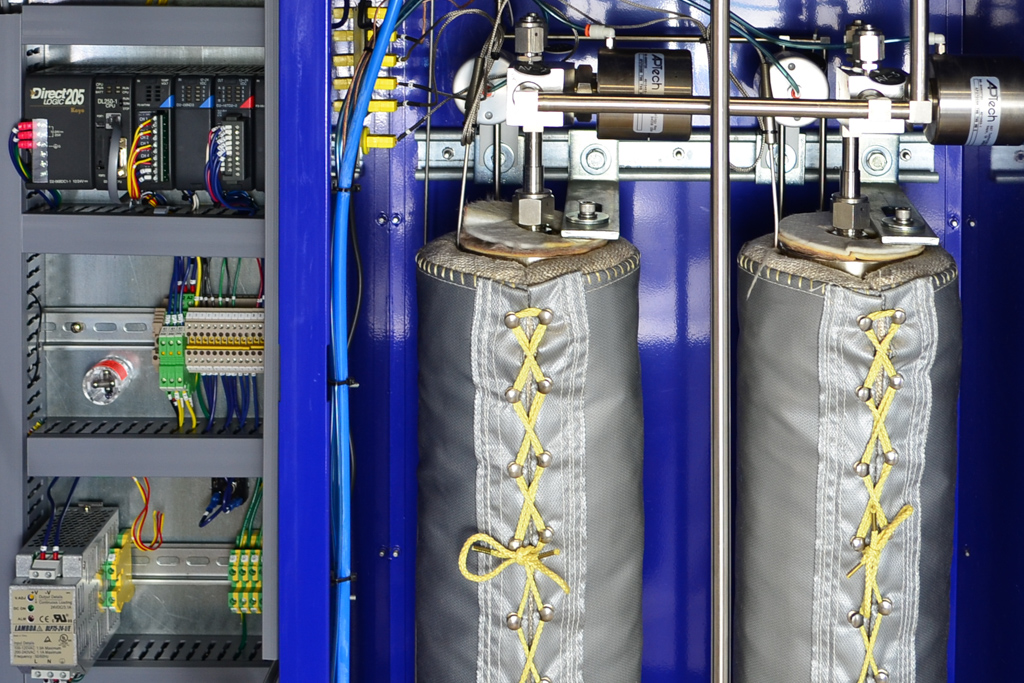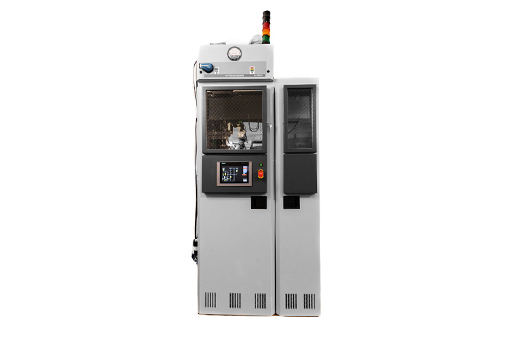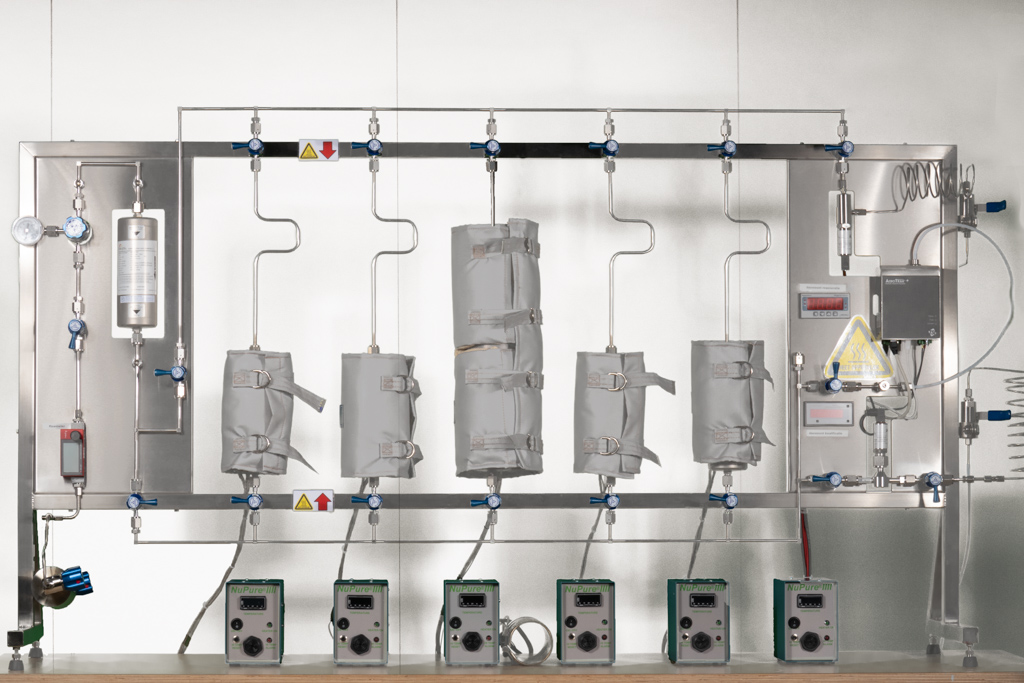Four purifier aspects in designing UHP gas systems
Tips for proper purification of gases, feeding tools in semicon fabs.
Accurate and reliable gas supply is a critical part of semiconductor manufacturing. Semiconductor manufacturing is a complex process in which multiple gases at different flow rates are carefully delivered to process chambers to produce critical elements on silicon wafers. To support today's extensive and varied applications, these gases must not only be delivered in precise quantities, but must also maintain strict purity levels.
As semiconductor technology continues to evolve, meeting stringent requirements for accurate and clean gas delivery has never been more important. Even a trace of contamination can render a chip unusable, leading to a host of unwanted costs. And those costs are getting higher and higher. In recent years, the research and design costs of developing a chip have increased from about $28 million at the 65 nanometer (nm) node to about $540 million at the advanced 5 nm node. According to McKinsey, construction costs for the same nodes have also increased from $400 million to $5.4 billion.
Why gas purity is so important
For plants, where the quality of the gas used in a process is intrinsically linked to yield, purifiers and filters are an integral part of the equipment landscape. If gases introduce contaminants during production, this can have serious implications for process quality and system integrity. Delivering an ultra-pure gas to tools in the semicon fab really only has 2 aspects:
- particulate contamination of the gas
- chemical purity of the gas
For particle removal we use filters, which depending on the application remove particles up to 1.5nm size and reach a purity of 100ppb. Achieving high chemical purity is more difficult, because gaseous chemical impurities pass the filters, because those molecules are much smaller than 1.5nm. More over, you only want the right type of molecules filtered. Therefore filtering is NO option for molecular impurity. To remove impurities at the molecular level a purifier is needed which uses chemical reactions and chemical bonding specificaly designed for certain gases, pressures and temperatures in the application. Applying the right purifiers for high and ultra-high purity applications is determined by various specifications, such as gas type, impurity, pressure and flow rate. There are four key considerations to ensure that your gas is pure and that the right purifier is used for your specific applications.
1. Determine the properties of each specific process gas.
The role of a gas purifier is to remove impurities from process gases to ensure that contaminants do not affect production. This requires a gas purification technology that can remove impurities down to the parts per billion (PPB) or parts per trillion (PPT) level. Different gases have different properties - some are highly flammable, hazardous or toxic. Common process gases include NH₃, CO₂, H₂, SiH4, HBr, Cl2, BCl3, DCS and PH3, and there is also a wide range of other gases that can be used, such as purge, passivation and fluorine gases. The ideal purification solution is designed with the properties of each specific process gas in mind, taking into account factors that may affect their stability during production.
2. Optimize the purifier for your unique flow requirements.
Pairing a purifier optimized for one flow rate with an application that requires a different flow rate can result in poor purification and reduced safety. The purifier solution must be matched to your unique flow requirements to achieve the purification and performance standards your application requires. Once a plant has determined the gas volume required, the next step is to consider which type of purifier to use: point of use, microbulk or bulk. Each purifier can be used separately or in series with others based on the gas flow rate, degree of impurity and required outlet purity. Bulk purifiers, for example, operate at ultra-high purity levels, making them ideal for UHP applications such as semiconductor manufacturing.
3. Ensure that the purifier meets pressure and temperature requirements.
You must know the exact pressure and temperature requirements of your application, as both affect your purifier selection. Pressure varies by gas type and process application, and there are additional requirements for high-temperature operation that vary based on gas type, intended impurity and function. The appropriate purifier solution must be matched to the specific pressure and temperature requirements of your application.

4. Perform preventive maintenance to keep purifiers working optimally.
Gas purifiers do not last forever, as they are designed for continuous use and will eventually reach the end of their useful life. When you install a purifier, preventive maintenance is essential to ensure that the purifier is always working optimally. You should put your purifiers on a preventive maintenance schedule and then make decisions about replacing or regenerating them before the life of the unit expires.

Photo: when purifiers reach their end of life, the'll often come back to Teesing and are examined in our research lab, to constantly move forward in our designs.
Conclusion: preparing semiconfabs and systems for long-term success
Today's semiconductor plants cannot afford to have impure gases disrupt their demanding manufacturing operations. Choosing the right purifier for your needs is absolutely critical in today's demanding and complex technological environment. Teesing Systems provides a full range of point-of-use, microbulk and bulk purifier solutions for high and ultra high purity applications that reliably meet mission-critical gas delivery requirements. We also delever all services to purifiers like: design, assembly, regeneration (in Netherlands).
Not sure what type of purifier you have? Please contact our sales engineers.

Photo: One of our purifier regeneration kits, which is capable of regenerating 5 purifiers simultaniously.
Subcategories

Point-of-use gas purifiers
Are installed directly at the place of the consumer. Usually with a flow rate of 0.1-100 slpm.
More information
Micro-bulk gas purifiers
Also called Area purifiers. Are often used to feed a number of machines with ultra pure process gas. Nominal flows 100-1200 slpm.
More information
Bulk gas purifiers
Gas supply in semicon fabs, or at industrial gas suppliers. Flows of 60-20.000 nm3/h.
More informationAny Questions?
More information about our products, services or looking for a custom solution?
Please contact our Sales Engineers.

WE MAKE YOUR TECHNOLOGY WORK
NL - Tel. +31 70 413 07 50
USA - Tel. +(1) 973 383 0691
CN - Tel. +86 (10) 56865822/56865835
TW - Tel. +886-(0)3-5600560
